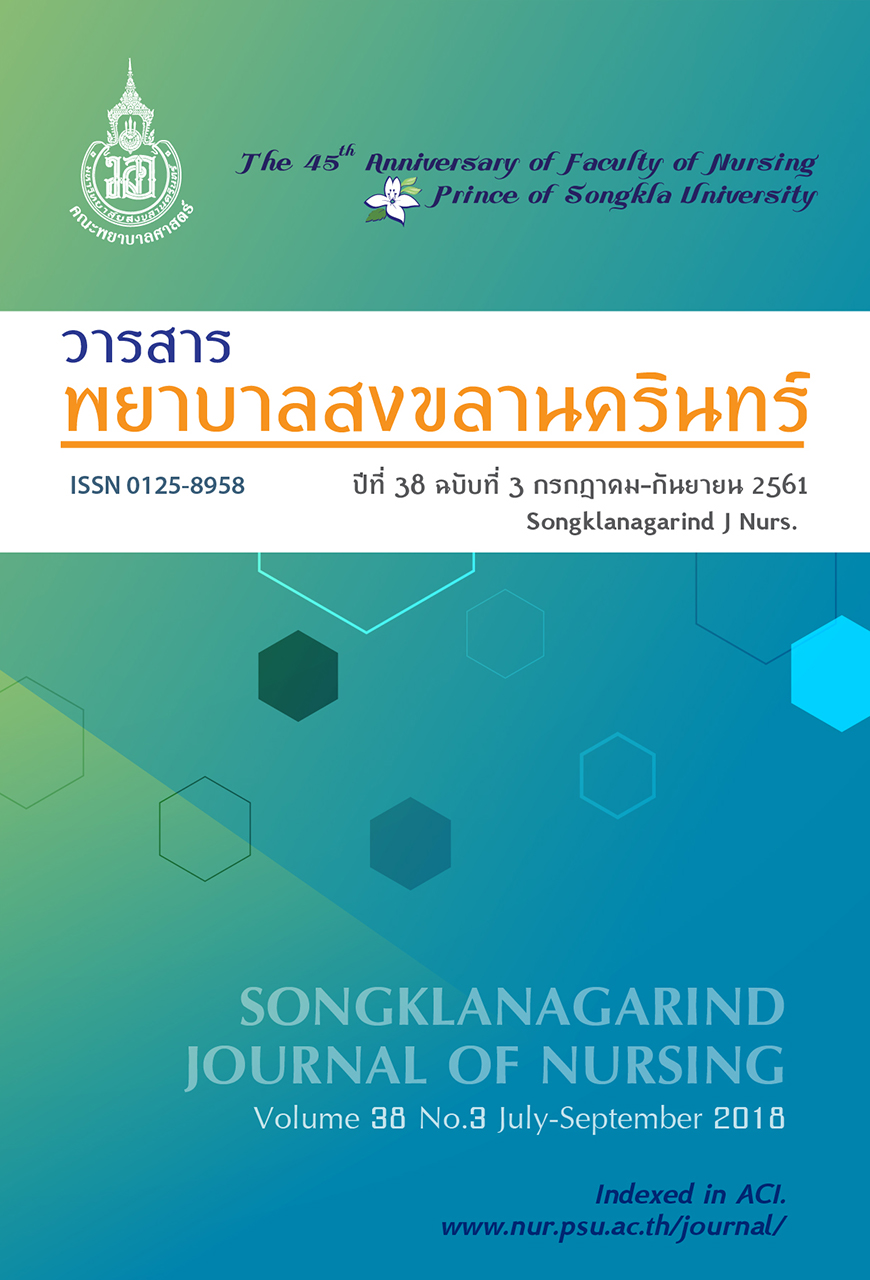The Experience of Self-Management in Patients With Uncontrolled Type 2 Diabetes, Sadao Hospital, Sadao, Songkhla
Main Article Content
Abstract
This qualitative research aimed to study the self-management experience of uncontrolled type 2 diabetes mellitus patients. The participants were 10 patients with blood glucose level more than 180 mg%, more than or equal to 2 times in 6 months, data was collected in February-April 2016 at the Diabetes Clinic, Sadao Hospital, Songkhla Province. The tools used were semi-structured interviews. In-depth interviews were recorded with tapes. The data was analyzed by the content analysis. Reliability of the research was performed based
on Lincoln and Guba.
The results revealed the self-management experiences of uncontrolled type 2 diabetic patients in 3 aspects: 1) self-management on diet, exercise and medication taking: likes sweet food, do not like exercise,discontinued medication; 2) role and emotion adaptation: ineffective adaptation and 3) seeking for alternative ways for blood sugar controlled: the pursuit of alternatives therapies is discontinuous or does not do well.
There were 3 related factors: 1) personal factors: know but not realize, 2) factors from health care persons:have a bad relationship and feel dissatisfied, 3) factors from families and society: they are not supported,and do not understand illness.
Promotion of positive attitude to self-management for patients and capability to care of family need to be done to support long term self-management, as well as enhance good relationships among patients and health care persons
Article Details
References
2. Rattarasarn C. Diabetes outbreak and its impact on Thailand. Bangkok: Novo Nordisk Pharma (Thailand) Ltd. 2013.Thai
3. Junchai J. Diabetes education and self-management program of persons with type 2 diabetes, PrachuapKhiri Khan province. The Public Health Journal of Burapha University. 2012;7(2): 69-83. Thai.
4. Kate R Lorig, halsted R Holman. Self-Management Education: History, Definition, Outcomes, and Mechanisms. [Internet]. California: K. R. Lorig, Dr. PH., Stanford Patient Education Research Center [cited 2015 nov 24]. Available from: https://www.researchgate.net/publication/10657284_SelfManagement_Education_History_Definition_Outomes_and_Mechanisms
5. Embrey N. A concept analysis of self-management in long-term conditions. British Journal of Neuroscience Nursing,2006;2 (10): 507-13.
6. Diabetes Association of Thailand. Clinical practice guideline for diabetes 2014. Bangkok: Aroon Printing Co.,Ltd. 2014. Thai.
7. Department of Health Service Support, Ministry of Public Health. Health behavior monitoring system to change the risk behavior of normal/risk/diabetic patients. Hypertension in Thailand: Policy toward Practice For primary care. 2013. Thai.
8. Tienthavorn W. Surveillance, Control and prevention system of DM and HT in Thailand: Policy of Action. [Internet]. Bangkok: The Agricultural Co-operative Federation of Thailand. LTD [2015 Oct 3]. Available from: http://www.hed.go.th/data_center/info_mod/
9. Lincoln YS, Guba EG. Naturalistic inquiry. Newbury Park,CA: Sage Publications; 1985.
10. Suthinarakorn W. Qualitative research: Research in alternative paradigm. Bangkok: Siam-parithas publishing co.,ltd. 2013.thai
11. Chantawuthinun T. Factors effective in lowering blood sugar levels of diabetes mellitus patients in the diabetes clinic of Saraphi hospital, Chiang Mai province. Journal of health system research. 2008;2(2):88- 95. Thai
12. Siriwattanapornkul T. Factors related to blood glucose level among patients with diabetes mellitus type II. Journal of Nursing Science Naresuan University. 2007;1(2):57-67. Thai.
13. Chompoosri M. Factors related to glycemic control behaviors among persons with diabetes mellitus at primary care unit, Sop prap district, Lampang province. Nursing Journal. 2008;35(4):120-31. Thai
14. Buraphan R, Muang Som N. Factors affectinguncontrolled type 2 diabetes mellitus of patients in Sangkhom hospital, Udonthani province, KKU Journal for Public Health Research. 2013;6(3):102-9. Thai
15. Tripeud K, Malathum P, Hanprasitkam K, et al. A synthesis of research of exercise influencing glycemic control in persons with type 2 diabetes. Ramathibodi Nursing Journal. 2010; 16(2): 259-78. Thai.
16. Suksri H. Drug use problems of home self-care patients in urban areas. Khon Kaen. Conference on Khon Kaen University. 2014: 761-64.Thai
17. Kessin J. Self-management, knowledge, quality of life in new cases with type II diabetes mellitus, pre-post type II diabetes patients self-management program in Urban Areas, Uthaithani province. Journal of Nursing.2013; 40(1): 84-103. Thai.
18. Meenongwah J. The meaning and management of depression among persons living with uncontrolled diabetes in North-east Thailand: A phenomenological study, nursing Journal of the Ministry of Public Health. 2009;23(1): 30-43. Thai.
19. Pumthong G, Nathason A, Tuseewan M, et al. Complementary and alternative medicines for diabetes mellitus management in ASEAN countries. Complementary Therapies in Medicine. 2015;23(4):617-25.
20. Phetarvut S. Factors predicting diabetes self-management behavior among patients with diabetes mellitus type 2. J Nurs Sci. 2011; 29(4):18-26. Thai.
21. Konghom C. Factors influencing self-managing behavior of diabetes mellitus patient at The Klongluang hospital Pathumthani Province. EAU Heritage Journal Science and Technology. 2014;8(2):248-58. Thai.
22. Vajiramethavi T. Correlation among predisposingfactors enabling factors reinforcing factors and practice of diabetes mellitus type ii patients who cannot control level of plasma glucose in Khon Kaen hospital, Khon Kaen province [dissertation]. [Khonkaen]: KhonKaen University; 2007. 86p. Thai.
23. Blixen CE., Kanuch S, Perzynski AT et al. Barriers to Self-management of Serious Mental Illness and Diabetes. Am J Health Behav. 2016; 40(2): 194-204. doi: 10.5993/AJHB.40.2.4.


